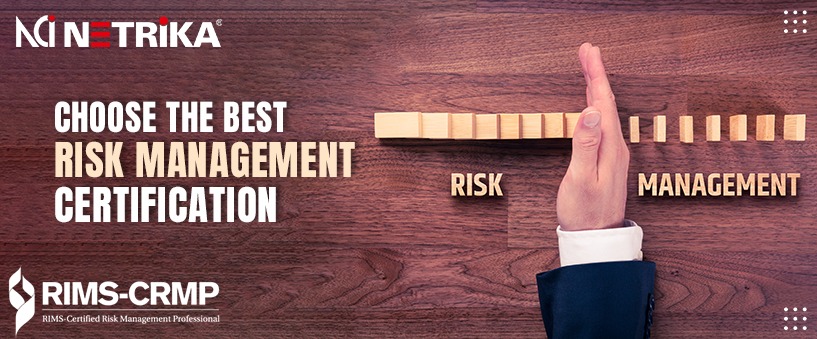
How do I choose the best risk management certification?
Risk management is an essential function in any organization, and having a certification in this field can demonstrate your knowledge and expertise in managing risks effectively. However, with so many certifications available, choosing the best one for your career goals and professional development can be challenging.
Organisations hire certified risk managers to decrease the potential of unfavourable repercussions on their operations. They assess many possibilities, such as natural calamities, operational risks, immoral behaviour, financial risks, etc. Those who complete risk management certification will be specialists in analysing and reducing risks such as legal hazards and credit risks. Furthermore, the best risk management courses assist in the professional development of people with risk management aptitude.
From the pool of available risk management courses, a professional must meet the required eligibility criteria and be prepared to explore the job opportunities and remuneration packages the sector offers after completing the course. Aspirants must also identify their career goals and the offerings by different certifications before they narrow down on which risk management course to pursue.
Identify your career goals
Before choosing a risk management certification, you need to identify your career goals. Consider the industry you work in and the type of role you aspire for.Do you want to specialise in financial risk management, cybersecurity risk management or enterprise risk management?Answering these questions can help you narrow down your choices and choose the best certification that aligns with your career goals.
Evaluate the certification’s credibility
Not all risk management certifications are created equal; some may hold more weight than others in the industry. Before choosing a certification, evaluate its credibility by researching the certification body’s reputation and the certification’s acceptance in your industry. Look for reviews and feedback from professionals who have earned the certification to gain insights into its value and worth.
Check the certification requirements
Each certification has its own set of requirements that you must meet before you can earn the certification. Check the certification requirements, such as education and experience, to determine whether you meet them. Some risk management certifications may also require you to complete a certain number of continuing education hours to maintain the certification.
Assess the certification exam
The certification exam is a crucial component of any certification program, and you should assess the exam’s content, difficulty level and format before choosing a certification. Look for information on the exam format, such as whether it’s computer-based or paper-based, the number of questions and the time allotted for the exam. You should also check the exam’s content to determine whether it aligns with your industry knowledge and experience.
Consider the cost
The cost of earning a risk management certification can vary widely depending on the certification body and the level of certification. Before choosing a certification, consider the cost of the certification exam, study materials, and any other associated costs, such as membership fees. Determine whether the cost is worth the investment and whether you can afford it.
Look for professional development opportunities
Earning a certification is just the first step in your professional development journey. Look for certifications that offer professional development opportunities, such as networking events, workshops and webinars, to enhance your knowledge and skills in risk management. These opportunities can also help you stay up-to-date with the latest trends and best practices in risk management.
Individuals increasingly appreciate the significance of risk management courses. Certifications are valuable instruments for demonstrating knowledge, increasing professional marketability, achieving higher incomes, and confirming professional experience. The greater the importance placed on professional certifications by organisations, the more prospects a certified individual will have for career advancement.
Risk management certification not only adds distinction to the company and its personnel, but it also gives independent proof that certified employees and the organisations they work for are informed about industry standards. The industry standard bearers ensure these criteria through rigorous testing. Companies that have certified personnel benefit from their continual professional growth, expanded skill set and ever-growing expertise due to connecting with a network of certified colleagues.
Therefore, choosing the best risk management certification requires careful consideration of your career goals, the certification’s credibility, requirements, exam, cost and professional development opportunities. By taking these factors into account, you can select a risk management certification that adds value to your career and helps you become a more skilled and knowledgeable risk management professional.
